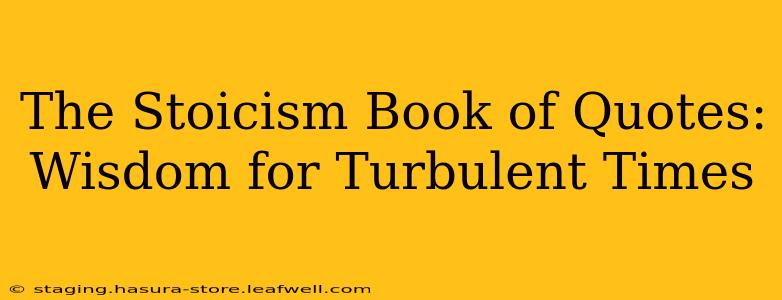The world feels turbulent. Uncertainty reigns, challenges abound, and the daily grind can leave us feeling overwhelmed. In such times, the timeless wisdom of Stoicism offers a powerful antidote. This collection of Stoic quotes isn't just a list; it's a guide to navigating life's storms with resilience, clarity, and inner peace. These aren't simply words; they're tools for cultivating a more fulfilling and meaningful life.
What is Stoicism?
Before we delve into the quotes themselves, it's helpful to understand the core tenets of Stoicism. Stoicism, a philosophy that flourished in ancient Greece and Rome, emphasizes virtue, reason, and living in harmony with nature. It teaches us to focus on what we can control—our thoughts and actions—and to accept what we cannot. This acceptance isn't passive resignation; it's a proactive approach to life, allowing us to respond to challenges with wisdom and grace.
Key Stoic Principles Reflected in These Quotes:
- Virtue as the Highest Good: Stoics believed that virtue—wisdom, justice, courage, and temperance—is the sole good. External factors like wealth, health, and reputation are considered "indifferents"—neither good nor bad in themselves.
- Control over Your Inner World: Stoicism emphasizes the power of self-mastery. By controlling our thoughts and reactions, we can find peace even amidst chaos.
- Living in Accordance with Nature: This involves understanding the natural order of the universe and aligning our lives with it. It's about accepting what is beyond our control and focusing on what we can influence.
- Dichotomy of Control: This is the cornerstone of Stoicism. It's the ability to distinguish between what we can control (our thoughts and actions) and what we cannot (external events).
A Selection of Stoic Quotes for Turbulent Times:
Here are some powerful quotes that embody the essence of Stoic philosophy, offering guidance and solace during challenging periods:
"The chief task in life is simply this: to identify and separate matters so that I can say clearly to myself which are externals not under my control, and which have to do with the choices which are my own." - Epictetus
This quote encapsulates the core principle of the dichotomy of control. It encourages us to analyze situations objectively, separating what we can influence from what we cannot, thereby reducing anxiety and fostering a sense of empowerment.
"Every day is a new life to a wise man." - Seneca
This quote reminds us of the power of perspective. Each day presents a fresh opportunity for growth, learning, and positive action. It encourages us to approach each day with renewed purpose and optimism.
"It is not things themselves that disturb men, but their judgments about these things." - Epictetus
This profound quote highlights the importance of our mental state. Our reactions to external events, not the events themselves, determine our emotional well-being. By controlling our judgments, we can control our emotional responses.
"You have power over your mind - not outside events. Realize this, and you will find strength." - Marcus Aurelius
This quote emphasizes the importance of inner resilience. External events are beyond our control, but our thoughts and reactions are not. By focusing on our internal world, we can cultivate mental strength and navigate life's challenges effectively.
"If you are distressed by anything external, the pain is not due to the thing itself, but to your estimate of it; and this you have the power to revoke at any moment." - Marcus Aurelius
This quote underscores our capacity to change our perspective and thereby reduce suffering. External events are neutral; it's our interpretation of those events that causes pain. By reframing our thoughts, we can alleviate our distress.
Frequently Asked Questions (FAQs):
How can Stoicism help me deal with stress and anxiety?
Stoicism provides practical tools for managing stress and anxiety by focusing on what you can control—your thoughts and actions—and accepting what you cannot. By practicing mindfulness and self-reflection, you can reduce emotional reactivity and cultivate inner peace.
Is Stoicism a religion?
No, Stoicism is a philosophy, not a religion. It doesn't involve a belief in a deity or a specific set of religious practices. It focuses on ethical living and self-improvement through reason and virtue.
Can Stoicism help me be more productive?
Yes, by focusing on what truly matters and prioritizing tasks based on their importance, Stoicism can enhance productivity. The elimination of unnecessary worries and concerns frees up mental energy, leading to greater efficiency and focus.
Where can I learn more about Stoicism?
There are many resources available to learn more about Stoicism, including books by classic Stoic philosophers like Epictetus, Marcus Aurelius, and Seneca, as well as modern interpretations and applications of Stoic principles.
Conclusion:
The Stoicism Book of Quotes offers a potent source of wisdom for navigating the complexities of life. By embracing the core principles of this ancient philosophy—virtue, reason, and self-mastery—we can cultivate inner peace, resilience, and a meaningful life, even in the face of adversity. Remember, it's not about eliminating challenges, but about facing them with wisdom, courage, and acceptance. Embrace the wisdom of the Stoics, and find strength in turbulent times.

